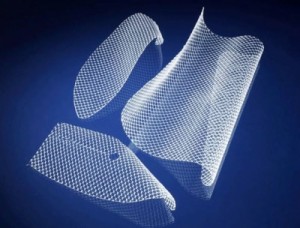LAWSUITS NEWS & LEGAL INFORMATION
Ethicon Physiomesh Lawsuits
By Jane Mundy
Lawsuits are being filed against the Johnson & Johnson subsidiary Ethicon alleging its Physiomesh Flexible Composite Mesh is a defective product. The abdominal mesh, which is used in laparoscopic hernia surgeries, has been linked to higher than normal revision rates than other surgical hernia mesh products. Ethicon announced a Physiomesh Flexible Composite Mesh withdrawal after patients suffered numerous adverse hernia side effects, including hernia mesh revision surgery. Physiomesh lawyers are investigating Ethicon complaints nationwide, and an Ethicon Physiomesh class action lawsuit has been filed in Canada.
En Español ETHICON PYSHIOMESH
FREE ETHICON PHYSIOMESH LAWSUIT EVALUATION
Send your Ethicon Physiomesh claim to a lawyer who will review your claim at NO COST or obligation.
GET LEGAL HELP NOW
GET LEGAL HELP NOW
Ethicon Physiomesh Flexible Composite Mesh
- recurrence of the hernia;
- bacterial infection—marked by fever and chills;
- pain or swelling at the operative site;
- , fluid-filled abscesses in the abdomen and groin;
- perforation of the organs or blood vessels.
Ethicon Physiomesh Recall
 In May 2016, the Ethicon Physiomesh Flexible Composite Mesh products were withdrawn from the market by Ethicon after studies suggested the medical implants had higher failure rates than other mesh products available on the market. The mesh was recalled in other countries, but not the U.S. Ethicon gave medical professionals up to September 16, 2016, to return unused products for a full refund. According to the withdrawal issued by Ethicon, "The recurrence/reoperation rates (respectively) after laparoscopic ventral hernia repair using ETHICON PHYSIOMESH™ Composite Mesh were higher than the average rates of the comparator set of meshes among patients in these registries."
In May 2016, the Ethicon Physiomesh Flexible Composite Mesh products were withdrawn from the market by Ethicon after studies suggested the medical implants had higher failure rates than other mesh products available on the market. The mesh was recalled in other countries, but not the U.S. Ethicon gave medical professionals up to September 16, 2016, to return unused products for a full refund. According to the withdrawal issued by Ethicon, "The recurrence/reoperation rates (respectively) after laparoscopic ventral hernia repair using ETHICON PHYSIOMESH™ Composite Mesh were higher than the average rates of the comparator set of meshes among patients in these registries."The two studies involved unpublished data from a pair of European registries that found a discrepancy between Physiomesh flexible composite and the other meshes in the registries after laparoscopic ventral hernia repair. In a letter to healthcare providers, the West Somerville, N.J.-based Ethicon believes higher revision rates are due to a “multifactorial issue,” possibly including “product characteristics, operative and patient factors,” but hasn’t been able to pin down a cause.
Ethicon said that patients already implanted with the product should be followed as usual. The recall does not involve any other Ethicon meshes, including the Physiomesh Open flexible composite mesh.
(In June 2012, Ethicon removed four transvaginal meshes from the market- Prolift, ProliftM+, TVT Secur and Prosima Pelvic Floor Repair System, stating the products were removed for business reasons.)
Ethicon Physiomesh and the FDA
Ethicon Physiomesh was approved by the FDA in March 2010. Here is the submission and approval , which doesn’t require human clinical trials and does not require a premarket approval application (PMA), as longs as it can be demonstrated that the new product is substantially equivalent to another device that was previously approved by the FDA. (The FDA’s 510(k) has a reputation for being easy, inexpensive, and less thorough.)
Ethicon told the FDA that its Flexible Composite Mesh met all testing criteria, demonstrated substantial equivalence to its predicate devices and did not raise any new questions of safety or effectiveness.
An Ethicon Physiomesh study showed that the mesh has a much higher failure rate than other widely available hernia mesh products: 20 percent of Ethicon Physiomesh implants fail within six months of implantation, requiring patients to undergo hernia revision surgery. Further, with each surgery, scar tissue build-up makes every revision attempt less likely to succeed. This hernia mesh is more likely to cause adhesions, seromas, hemorrhage and lower tissue integration in patients.
Ethicon Physiomesh Lawsuits
The first physiomesh lawsuit was filed by Matthew Huff, just weeks before the mesh was withdrawn by the company, alleging that the hernia repair mesh was defective, unreasonably dangerous and not suitable for use. Huff developed severe abdominal pain, ever, chills, nausea and redness. He was treated for an infection and two abscesses and an intestinal fistula. The trial is set for January 2018 in the Southern District of Illinois. (Case No. 3:16-cv-00368-JPG-PMF)
A Florida woman in September 2016 filed a lawsuit following failed incisional hernia repair in May 2014 with Ethicon’s Physiomesh Flexible Composite Mesh (Product Code PHY2025V). After hernia surgery, Joanne Quinn experienced persistent abdominal pain, diminished bowel motility and bowel obstruction. She underwent a revision surgery in July 2015 but the surgeon was unable to remove all of the allegedly defective material from her body. In the lawsuit, Quinn claims that she will likely suffer pain and medical complications for the rest of her life due to debris from the hernia patch that remains in her abdominal wall. She further claims that Physiomesh is made from materials that are not inert and that react to human tissues, placing patients at risk for chronic pain, infection, hernia recurrence, adhesions, intestinal blockage, mesh migration, mesh contraction and repeated surgery.
Legal Help
If you or a loved one has suffered similar damages or injuries, please click the link below and your complaint will be sent to a lawyer who may evaluate your claim at no cost or obligation.
Last updated on
ETHICON PHYSIOMESH LEGAL ARTICLES AND INTERVIEWS
Bard to Pay $500,000 in Third Bellwether Trial

New FDA Hernia Mesh Information and its Flawed 501(k) Process

Hernia Mesh Updates: Bard Trial and FDA’s Pros and Cons


November 25, 2023
In the third hernia mesh bellwether trial in multidistrict litigation, C.R. Bard and Davol Inc. were ordered by a federal jury to pay $500,00 to a Maine man who claimed his hernia mesh caused pain and other complications. The jurors found the company liable for failure to warn, strict liability, and negligence but Bard was off the hook for any punitive damages. READ MORE
New FDA Hernia Mesh Information and its Flawed 501(k) Process

September 6, 2023
In response to a multitude of hernia mesh adverse event reports, the FDA published new information in July about the risks and benefits of hernia mesh surgery. The agency gives non-surgical options and advises that patients should obtain certain information “If you have post-surgical problems”. It would seem like the FDA has made a hernia mesh mess. READ MORE
Hernia Mesh Updates: Bard Trial and FDA’s Pros and Cons

July 25, 2023
C.R. Bard’s request to replace the final two bellwether hernia mesh injury cases previously selected for trial, arguing that the claims are no longer representative of other claims pending in the litigation, were denied by U.S. District Judge Sargus. Bard’s reasoning is that plaintiffs’ injuries have worsened since filing their complaints: pain has advanced to severe injury. READ MORE
READ MORE Surgical Mesh Settlements and Legal News
READ MORE Defective Products Settlements and Legal News
READ MORE Drugs/Medical Settlements and Legal News
READ MORE Personal Injury Settlements and Legal News
READ MORE Defective Products Settlements and Legal News
READ MORE Drugs/Medical Settlements and Legal News
READ MORE Personal Injury Settlements and Legal News

READER COMMENTS
dave miga
on
Disclosure: I engineer medical electronics where peoples lives are on the line. Too bad there are others in the engineering and design industry that don't have the brains or talent required.